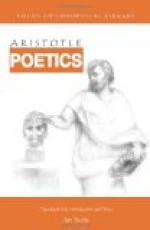A word is lengthened when its own vowel is exchanged for a longer one, or when a syllable is inserted. A word is contracted when some part of it is removed. Instances of lengthening are,—{pi omicron lambda eta omicron sigma} for {pi omicron lambda epsilon omega sigma}, and {Pi eta lambda eta iota alpha delta epsilon omega} for {Pi eta lambda epsilon iota delta omicron upsilon}: of contraction,—{kappa rho iota}, {delta omega}, and {omicron psi}, as in {mu iota alpha / gamma iota nu epsilon tau alpha iota / alpha mu phi omicron tau episilon rho omega nu / omicron psi}.
An altered word is one in which part of the ordinary form is left unchanged, and part is re-cast; as in {delta epsilon xi iota-tau epsilon rho omicron nu / kappa alpha tau alpha / mu alpha zeta omicron nu}, {delta epsilon xi iota tau epsilon rho omicron nu} is for {delta epsilon xi iota omicron nu}.
[Nouns in themselves are either masculine, feminine, or neuter. Masculine are such as end in {nu}, {rho}, {sigma}, or in some letter compounded with {sigma},—these being two, and {xi}. Feminine, such as end in vowels that are always long, namely {eta} and {omega}, and—of vowels that admit of lengthening—those in {alpha}. Thus the number of letters in which nouns masculine and feminine end is the same; for {psi} and {xi} are equivalent to endings in {sigma}. No noun ends in a mute or a vowel short by nature. Three only end in {iota},—{mu eta lambda iota}, {kappa omicron mu mu iota}, {pi epsilon pi epsilon rho iota}: five end in {upsilon}. Neuter nouns end in these two latter vowels; also in {nu} and {sigma}.]
XXII
The perfection of style is to be clear without being mean. The clearest style is that which uses only current or proper words; at the same time it is mean:—witness the poetry of Cleophon and of Sthenelus. That diction, on the other hand, is lofty and raised above the commonplace which employs unusual words. By unusual, I mean strange (or rare) words, metaphorical, lengthened,—anything, in short, that differs from the normal idiom. Yet a style wholly composed of such words is either a riddle or a jargon; a riddle, if it consists of metaphors; a jargon, if it consists of strange (or rare) words. For the essence of a riddle is to express true facts under impossible combinations. Now this cannot be done by any arrangement of ordinary words, but by the use of metaphor it can. Such is the riddle:—’A man I saw who on another man had glued the bronze by aid of fire,’ and others of the same kind. A diction that is made up of strange (or rare) terms is a jargon. A certain infusion, therefore, of these elements is necessary to style; for the strange (or rare) word, the metaphorical, the ornamental, and the other kinds above mentioned, will raise it above the commonplace and mean, while the use of proper words will make it perspicuous. But nothing contributes more to produce a clearness of diction that is remote




